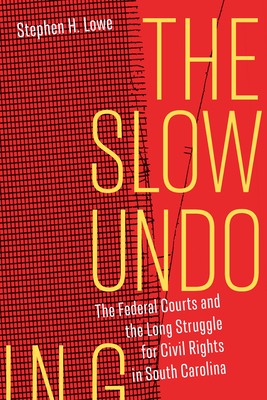
- We will send in 10–14 business days.
- Author: Stephen H Lowe
- Publisher: University of South Carolina Press
- ISBN-10: 1643362054
- ISBN-13: 9781643362052
- Format: 15.2 x 22.9 x 1.5 cm, minkšti viršeliai
- Language: English
- SAVE -10% with code: EXTRA
Reviews
Description
A study of how South Carolina's federal district courts were central to achieving and solidifying gains during the civil rights movement
As the first comprehensive study of one state's federal district courts during the long civil rights movement, The Slow Undoing argues for a reconsideration of the role of the federal courts in the civil rights movement. It places the courts as a central battleground at the intersections of struggles over race, law, and civil rights. During the long civil rights movement, Black and White South Carolinians used the courts as a venue to contest the meanings of the constitution, justice, equality, and citizenship.
African American plaintiffs and lawyers from South Carolina, with the support of Thurgood Marshall and other lawyers from the NAACP Legal Defense and Education Fund, brought and argued civil rights lawsuits in South Carolina's federal courts attempting to secure the vote, raise teacher salaries, and to equalize and then desegregate schools, parks, and public life. In response, white citizens, state politicians, and local officials, hired their own lawyers who countered these arguments by crafting new legal theories in an attempt to defend state practices and thwart African American aspirations of equality and to preserve white supremacy.
The Slow Undoing argues for a reconsideration of the role of federal courts in the civil rights movement by demonstrating that both before and after Brown v. Board of Education, the federal district courts were centrally important to achieving and solidifying civil rights gains. It relies on the entire legal record of actions in the federal district courts of South Carolina from 1940 to 1970 to make the case. It argues that rather than relying on litigation during the pre-Brown era and direct action in the post-Brown era, African Americans instead used courts and direct action in tandem to bring down legal segregation throughout the long civil rights era. But the process was far from linear and the courts were not always a progressive force. The battles were long, the victories won were often imperfect, and many of the fights remain. Author Stephen H. Lowe offers a chronicle of this enduring struggle.
EXTRA 10 % discount with code: EXTRA
The promotion ends in 23d.22:41:44
The discount code is valid when purchasing from 10 €. Discounts do not stack.
- Author: Stephen H Lowe
- Publisher: University of South Carolina Press
- ISBN-10: 1643362054
- ISBN-13: 9781643362052
- Format: 15.2 x 22.9 x 1.5 cm, minkšti viršeliai
- Language: English English
A study of how South Carolina's federal district courts were central to achieving and solidifying gains during the civil rights movement
As the first comprehensive study of one state's federal district courts during the long civil rights movement, The Slow Undoing argues for a reconsideration of the role of the federal courts in the civil rights movement. It places the courts as a central battleground at the intersections of struggles over race, law, and civil rights. During the long civil rights movement, Black and White South Carolinians used the courts as a venue to contest the meanings of the constitution, justice, equality, and citizenship.
African American plaintiffs and lawyers from South Carolina, with the support of Thurgood Marshall and other lawyers from the NAACP Legal Defense and Education Fund, brought and argued civil rights lawsuits in South Carolina's federal courts attempting to secure the vote, raise teacher salaries, and to equalize and then desegregate schools, parks, and public life. In response, white citizens, state politicians, and local officials, hired their own lawyers who countered these arguments by crafting new legal theories in an attempt to defend state practices and thwart African American aspirations of equality and to preserve white supremacy.
The Slow Undoing argues for a reconsideration of the role of federal courts in the civil rights movement by demonstrating that both before and after Brown v. Board of Education, the federal district courts were centrally important to achieving and solidifying civil rights gains. It relies on the entire legal record of actions in the federal district courts of South Carolina from 1940 to 1970 to make the case. It argues that rather than relying on litigation during the pre-Brown era and direct action in the post-Brown era, African Americans instead used courts and direct action in tandem to bring down legal segregation throughout the long civil rights era. But the process was far from linear and the courts were not always a progressive force. The battles were long, the victories won were often imperfect, and many of the fights remain. Author Stephen H. Lowe offers a chronicle of this enduring struggle.


Reviews